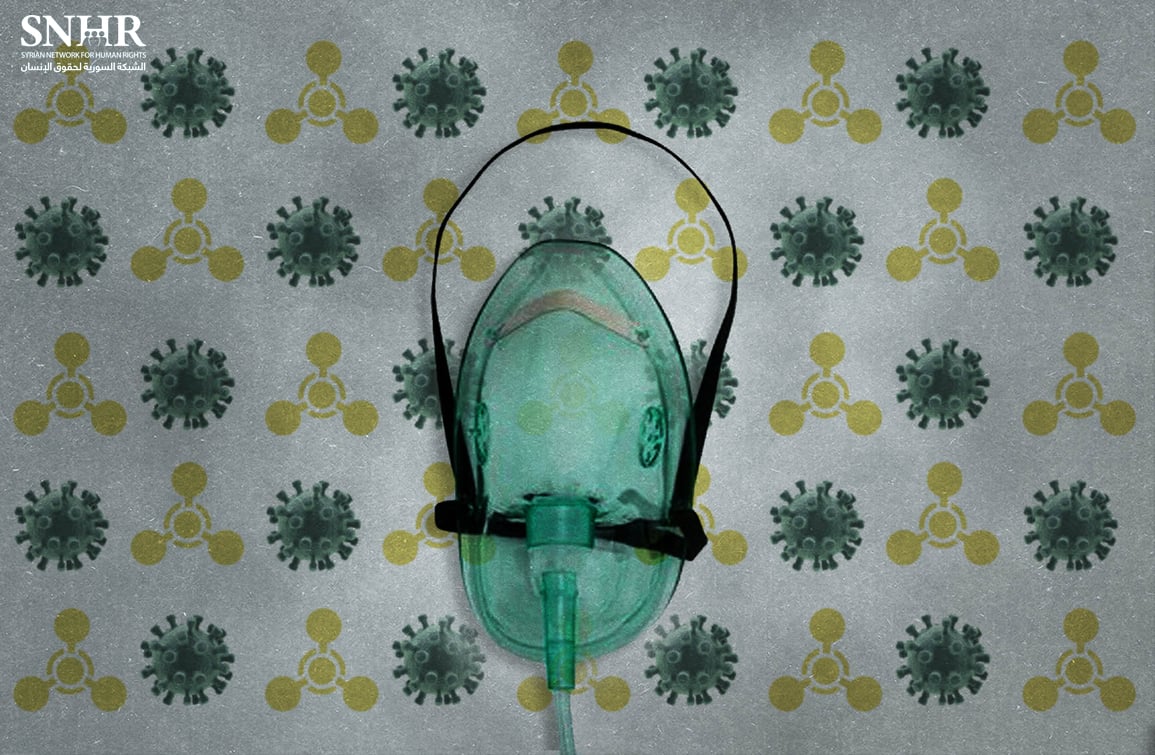The Syrian Regime, Which Is Responsible for Using Chemical Weapons 217 Times and for Their Proliferation in Syria, Can’t Be Considered Trustworthy in the Fight Against the COVID-19 Pandemic

Press release:
In the Syrian Network for Human Rights’ (SNHR) latest report issued today marking the third anniversary of the Syrian regime’s chemical attack on Khan Sheikhoun and the second of its attack on Douma city, SNHR emphasizes that the Syrian regime, which is responsible for using chemical weapons 217 times and for their proliferation in Syria, can’t be considered trustworthy in the fight against the COVID-19 pandemic.
The four-page report notes that due to the COVID-19 pandemic’s spread to most countries worldwide, including Syria, a number of totalitarian states, dictatorships and civil society organizations affiliated with them have raised their voices, urging a reduction in or total lifting of the sanctions imposed on the Syrian regime, supposedly so that the Syrian regime can combat this pandemic.
In this context, the report recalls that these totalitarian states and dictatorships have never condemned the Syrian regime’s use of chemical weapons against Syrian civilians, but instead consistently justified and defended their use; this being the case, the report notes one can’t imagine that the same states are keen to protect the health and wellbeing of the Syrian people from the COVID-19 pandemic, especially when we know that the Syrian regime organs that committed the heinous crime of repeatedly using chemical weapons are the same ones still governing Syria to date. The report notes that these calls are a blatant attempt to obtain funds for the regime in foreign currencies, and there is no doubt that the vast majority of any funds obtained would be used by the regime to commit more violations, with the aim of remaining in power.
The report includes the death toll in both attacks, on Khan Sheikhoun in Idlib suburbs on April 4, 2017, and on Douma in Damascus Suburbs on April 7, 2018, noting that all the victims, their families and their loved ones, as well as the rest of the Syrian community’s people, and a large part of the people of the region and the world are waiting to see the Syrian regime finally being held accountable for these heinous crimes, which constitute war crimes and crimes against humanity.
The report also notes that despite the accurate and highly credible investigations, which confirmed the occurrence of the Khan Sheikoun and Douma attacks, the Security Council failed to move to take any form of active measures, including economic, political or military sanctions, to implement its relevant resolutions.
The report provides statistics demonstrating that the Syrian regime has used chemical weapons at least 217 times, including 33 attacks before Security Council Resolution 2118 and 184 attacks after it; among the latter 184 attacks, 115 attacks occurred after Resolution 2209, and 59 attacks after Resolution 2235, with all of these attacks resulted in the deaths of at least 1,510 individuals, including 205 children and 260 women (adult female).
The report calls on the United Nations and the Security Council to impose economic, political and military sanctions on the Syrian regime on the anniversary of its use of chemical weapons against Khan Sheikhoun and Douma, and calls on the Syrian regime’s allies to condemn its use of chemical weapons, to work with the rest of the world to hold the Syrian regime to account, and to pressure it to enter into a political process that leads to a real political transition away from the despotic hereditary rule of the ruling family, which would contribute to lifting sanctions and moving towards democracy and stability.
The report recommends that the European Union, the United States of America, Canada, Australia and the rest of the world that imposed sanctions on the Syrian regime should insist on a permanent link between the issue of sanctions and achievement of a real political transition because easing the sanctions in the presence of the same leadership and state organs involved in crimes against humanity and war crimes means providing support to these repressive entities.
The report also stresses the need to increase the provision of humanitarian assistance to the World Health Organization to work in Syria in all regions, to ensure that its work is practiced freely away from the influence of local organizations affiliated with the Syrian regime in the areas under its control, and to continue to work to hold the Syrian regime to account for its use of weapons of mass destruction.
The report notes that in light of the continued failure of the UN Security Council, it is imperative to consider establishing a civilizational and humanitarian alliance in accordance with clear criteria aimed at providing urgent protection for civilians from brutal regimes in the event of their committing war crimes and crimes against humanity.


